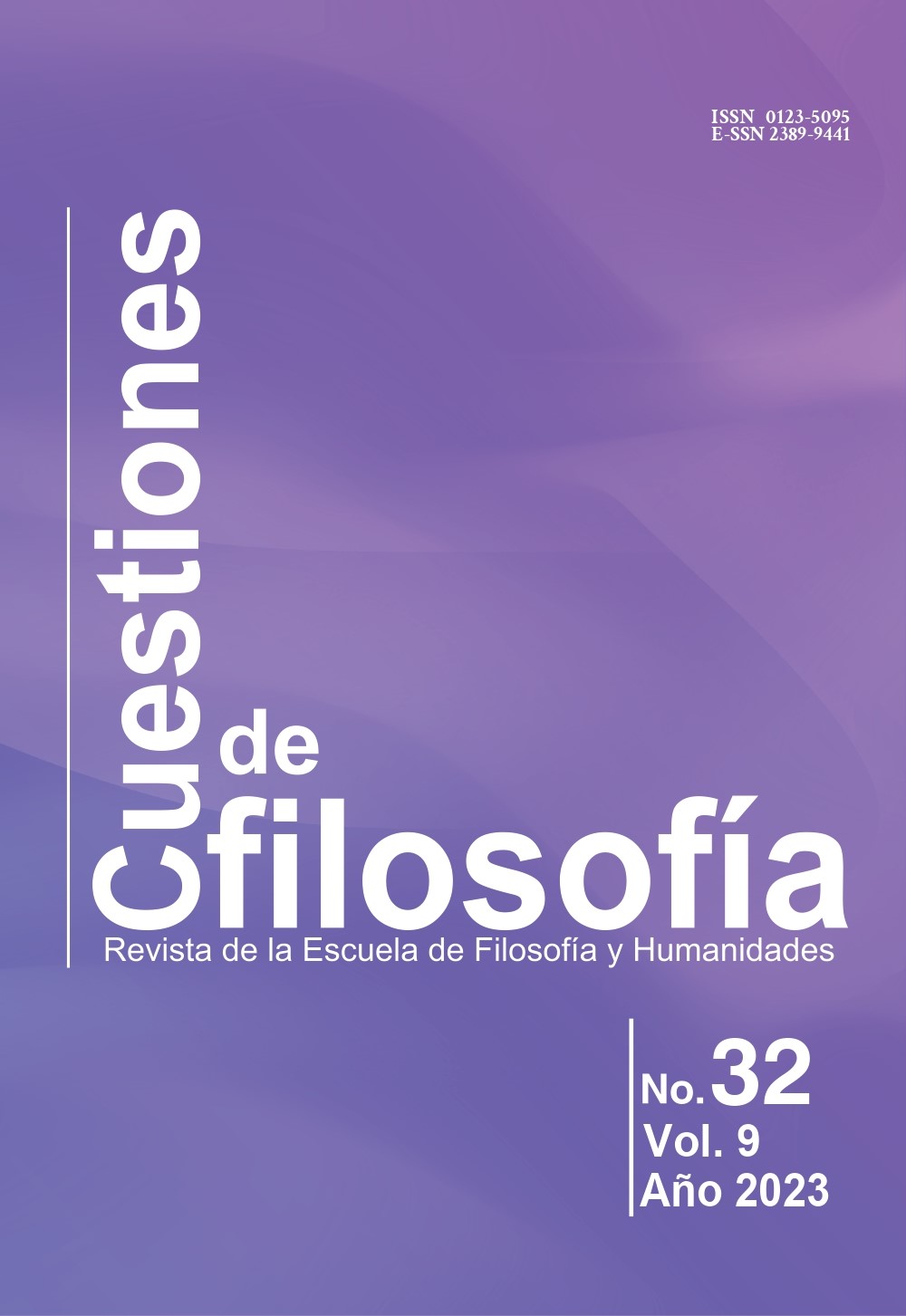Contra el objetivismo y el psicocriticismo. La epistemología hermenéutica de las ciencias humanas

Resumen
Este artículo pretende hacer una aportación a la fundamentación de la epistemología de las ciencias humanas. Con esta aportación se busca indagar por la función que tiene la vivencia subjetiva y cómo ésta afecta la objetividad del
conocimiento humanístico. Este trabajo apela a la poesía como ejemplo de objeto de las humanidades, las cuales piensan a partir de la experiencia vital, pero deben salvar, al mismo tiempo, la objetividad de significado. Tan perjudicial es el objetivismo abstracto como base epistemológica de las humanidades, como el subjetivismo radical, de manera que el peligro que amenaza a la epistemología de las ciencias humanas hoy es la despersonalización. Las
humanidades tienen que conciliar vivencia personal y sentido objetivo.
Palabras clave
vivencia, objetividad, ciencias humanas, epistemología, poesía
Citas
- Agamben, G. (1982). Il linguaggio e la morte. Torino: Einaudi.
- Bachelard, G. (1961). La poétique de l’espace. Paris: PUF.
- Bernard-Donals, M. F. (1998). The practice of theory: rhetoric, knowledge, and pedagogy in the Academy. Cambridge: Cambridge University Press. DOI: https://doi.org/10.1017/CBO9780511585142
- Bollnow, O. F. (1962). Maβ und Vermessenheit des Menschen. Philosophische Aufsätze. Göttingen: Vandenhoeck & Ruprecht.
- Chaouli, M. (2021). Schlegel’s words, rightly used. Poetic critique. Encounters with art and literature (pp. 19-34). Berlin: De Gruyter. DOI: https://doi.org/10.1515/9783110688719-003
- Combe, D. (1996). La référence dédoublée: le sujet lyrique entre fiction et autobiographie. D. Rabaté (Ed.), Figures su sujet lyrique (pp. 40-63). Paris: PUF.
- Daston, L. (2014). Objectivity and impartiality. Epistemic virtues in the humanities. R. Bod (Ed.), The making of the humanities. Volume III. The modern humanities (pp. 27-41). Amsterdam: Amsterdam University Press. DOI: https://doi.org/10.1515/9789048518449-002
- Dilthey, W. (1978). Das Erlebnis, Die geistige Welt. Gesammelte Schriften VI (pp. 313-317). Stuttgart: Teubner.
- Dilthey, W. (1979a). Einleitung in die Geisteswissenschaften. Gesammelte Schriften I. Stuttgart: Teubner.
- Dilthey, W. (1979b). Der Aufbau der geschichtlichen Welt in den Geisteswissenschaften. Gesammelte Schriften VII. Stuttgart: Teubner.
- Dilthey, W. (2005). Goethe und die dichterische Phantasie. Das Erlebnis und die Dichtung. Gesammelte Schriften XXVI (pp. 113-172). Göttingen: Vandenhoeck & Ruprecht. DOI: https://doi.org/10.13109/9783666303289.113
- Eckermann, J. P. (1999). Gespräche mit Goethe. Sämtliche Werke. Band XII. Frankfurt a. M: Deutscher Klassik.
- Esterhammer, A. (2002). The romantic ode. A. Esterhammer (Ed.), Romantic poetry (pp. 143-162). Amsterdam: Johns Benjamins. DOI: https://doi.org/10.1075/chlel.xvii.11est
- Foucault, M. (1969). L’archéologie du savoir. Paris: Gallimard.
- Gadamer, H-G. (1990). Hermeneutik I. Wahrheit und Methode. Gesammelte Werke I. Tübingen: Mohr (Siebeck).
- Gadamer, H-G. (1993a). Ästhetik und Hermeneutik, Ästhetik und Poetik I. Kunst als Aussage. Gesammelte Werke VIII (pp. 1-8). Tübingen: Mohr (Siebeck).
- Gadamer, H-G. (1993b). Über den Beitrag der Dichtkunst bei der Suche nach der Wahrheit, Ästhetik und Poetik I. Kunst als Aussage. Gesammelte Werke VIII (pp. 70-79). Tübingen: Mohr (Siebeck).
- Gadamer, H-G. (1993c). Vorwort zur 2. Auflage [von Wahrheit und Methode], Hermeneutik II. Wahrheit und Methode. Gesammelte Werke II (pp. 437-448). Tübingen: Mohr (Siebeck).
- Gadamer, H-G. (1993d). Die Kontinuität der Geschichte und der Augenblick der Existenz. Hermeneutik II. Wahrheit und Methode. Gesammelte Werke II (pp. 133-145). Tübingen: Mohr (Siebeck).
- Gadamer, H-G. (1993e). Wort un Bild -so wahr, so seined. Ästhetik und Poetik I. Kunst als Aussage. Gesammelte Werke VIII (pp. 373-399). Tübingen: Mohr (Siebeck).
- Gadamer, H-G. (1993f). Die Aktualität des Schönen, Ästhetik und Poetik I. Kunst als Aussage. Gesammelte Werke VIII (pp. 94-142). Tübingen: Mohr (Siebeck).
- Goethe, J. W. (1996). Ein Wort für jungen Dichter. Sämtliche Werke XVIII.II (pp. 219-220). München: Hanser.
- Goethe, J. W. (2000). Aus meinem Leben. Dichtung und Wahrheit IX. München: Deutscher Taschenbuch.
- Gullón, R. (1960). Estudios sobre Juan Ramón Jiménez. Buenos Aires: Losada.
- Habermas, J. (1992). Erkenntnis und Interesse. Frankfurt a. M: Suhrkamp.
- Hamburger, K. (1977). Die Logik der Dichtung. München: Klett / Cotta.
- Hegel, G. W. F. (1986). Vorlesungen über die Ästhetik III. Werke XV. Frankfurt a. M: Suhrkamp.
- Heidegger, M. (1977a). Die Zeit des Weltbildes. Holzwege (GA 5) (pp. 75-113). Frankfurt a. M: Klostermann. DOI: https://doi.org/10.5771/9783465142362-75
- Heidegger, M. (1977b). Der Ursprung des Kunstwerkes. Holzwege (GA 5) (pp. 1-74). Frankfurt a. M: Klostermann. DOI: https://doi.org/10.5771/9783465142362-1
- Heidegger, M. (1996). Der Wille zur Macht als Kunst. Nietzsche I (GA 6.1) (pp. 1-22). Frankfurt a. M: Klostermann.
- Horacio (2008). Ars Poetica. Stuttgart: Reclam.
- Jakobson, R. (1987). Linguistics and Poetics. Language in Literature (pp. 62-94). Cambridge: Cambridge University Press.
- Kusch, M. (1995). Psychologism. A case study in the sociology of philosophical knowledge. London: Routledge.
- Nietzsche, F. (1980). Jenseits von Gut und Böse. KSA 5. Berlin: De Gruyter.
- Olson, P. R. (1983). La luz con el tiempo dentro: Ser y tiempo en la poesía de Juan Ramón Jiménez. Actas del Congreso Internacional del Centenario de Juan Ramón Jiménez. Tomo II (pp. 435-443). Huelva: Diputación de Huelva.
- Ortega y Gasset, J. (2004). Meditaciones del Quijote, Obras completas. Tomo I. Madrid: Taurus / Fundación Ortega.
- Quéma, A. (1999). The agon of modernism. Lewisburg: Bucknell University Press.
- Sloterdijk, P. (1988). Zur Welt kommen - Zur Sprache kommen. Frankfurt a. M: Suhrkamp.
- Steinmetz, G. (2021). Historicism and positivism in sociology. H. Paul y A. von Veldhuizen (Eds.), Historicism. A travelling concept (pp. 57-96). London: Bloomsbury. DOI: https://doi.org/10.5040/9781350121980.ch-003
- Stierle, H. (1997). Ästhetische Rationalität. München: Fink.
- Szuba, M. (2019). Contemporary scottish poetry and the natural world. Edinburgh: Edinburgh University Press. DOI: https://doi.org/10.3366/edinburgh/9781474450607.001.0001
- Unamuno, M. (1980). Del sentimiento trágico de la vida. Madrid: Espasa / Calpe.
- Wellek, R. (1979). Genre Theory, the Lyric, and Erlebnis. Discriminations: Further Concepts of Criticism (pp. 225-252). Yale University Press.